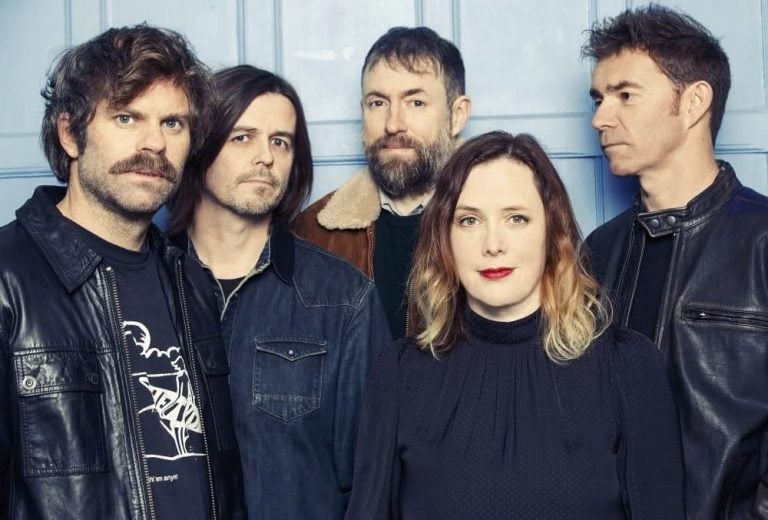“I like your old stuff better than your new stuff” isn’t only an excellent Regurgitator song – it’s a maxim that has vast relevance in the world of popular music, particularly in the case of iconic bands releasing much hyped, long-delayed comeback records. After all, in most instances, such releases are lukewarmly received, with key cultural players and critics falling over themselves to diagnose a whole range of creative problems.
However, at the risk of telling the story before the ink has figuratively dried, it feels pretty safe to say this isn’t how history will remember Slowdive’s new self-titled album, the UK five-piece’s first since Pygmalion in 1995. The record has been warmly embraced since its release in May not only by the band’s extensive fanbase, but by critics over at Pitchfork and The Guardian, who have called it a riveting return to form.
Ultimately, all that resounding praise is a testament to the patience and caution with which the band approached the album. They didn’t rush the thing; they teased it out carefully, never putting pressure on themselves.
“We were slightly apprehensive about bringing out a new album,” says guitarist Christian Savill. “Obviously people loved what we did 20 odd years ago, so you worry that you might ruin what people liked about you. But what’s been really nice is that the new songs that we’re playing are going down as well as – if not better than – the old ones. And there’s quite a lot of young people [at the shows], so we’re pretty amazed by that.”
The five core members of Slowdive kept making music in the 22 years between Pygmalion and Slowdive. Singer/guitarists Neil Halstead and Rachel Goswell formed Mojave 3; drummer Simon Scott fronted Televise; and Savill formed his own band, Monster Movie. But despite the individual achievements of these various projects, the announcement of a new Slowdive album was always going to attract a heightened level of attention and scrutiny.
“When we got back together, the hope was that we would do a new record,” says Savill. “We didn’t want to be a band that just played old songs. We wanted to be a fully functioning band, because the first time round that’s what we enjoyed doing – making music together.
“But similarly, we didn’t actually know if we could still make music, and if we did, what it would sound like. We’d done other stuff for 20 years; it could be that Slowdive might not work anymore. So we just worked quietly, trying to see where we could go, and for a little while we didn’t know if we could make a record that we liked. But slowly it came together, and we ended up being really happy with it.”
When we got back together, the hope was that we would do a new record.
Even if Slowdive was conceived in relative secrecy, there was still some internal pressure attached to making the album. Slowdive isn’t a new project after all: even in their second life, the band had a stack of hardcore fans and three adored albums to keep in mind. So the challenge became experimenting with new ideas while remaining true to the Slowdive sound – to wrangle with past creative achievements, as well as the era and experiences that shaped the band’s original incarnation.
“We’d be working on songs and we’d think, ‘Oh, it doesn’t sound like Slowdive would do this.’ So we did always have in the back of our minds that it still had to be a Slowdive record,” says Savill. “We wanted people to listen to it and think, ‘This is still Slowdive,’ and not some totally separate thing. But it was hard to get a balance because sometimes you’re thinking, ‘Is this too much like Slowdive? Is this not Slowdive enough?’”
Before showing any new music to the world, the band needed to feel confident they’d created something they could feel creatively satisfied with, no matter the widespread critical and commercial response. Anything short of that and they’d have pulled the plug.
“We wouldn’t have released it if we didn’t like it. We always said if nothing good comes of these sessions, we just won’t release anything and [we’ll] disappear into the shadows again. We were happy with it, but to be honest we were nervous about how people would receive it. We’d done other records in the past which we’d liked and other people had, at the time, not liked.
“You can never be sure of what people are going to think about it. So we were nervous about it. You’re putting something out there and it’s got your name on it and you hope people like it, but you can’t control that. We battled with that until we could get to the point where we forgot about all that. When we just got on with it and stopped thinking about it, then it started coming together.”
The shoegaze figureheads will be landing in Australia for the 2018 Laneway Festival, and Slowdive’s appearance on a festival tour that tends to bypass nostalgic bookings is further verification of the direct impact the band’s new album has had.
“Australia’s one place we always really hoped we could get over to, and we weren’t sure if we could. We didn’t know if anyone would want us there to be honest. So it’s going to be pretty amazing to get over there. Getting on the Laneway Festival was pretty amazing as well, because that’s a load of current bands. To be thought of in that way is really nice for us.”
Slowdive play Laneway 2018 on Sunday February 4, and a headlining show at the Metro Theatre on Wednesday January 31.
While you’re on a shoegaze kick, read our interview with the reformed lineup of Ride.

































